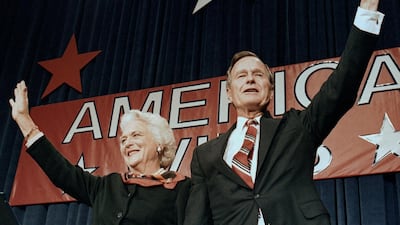Tributes to George Herbert Walker Bush have poured in since his death, aged 94, on Saturday. From Mikhail Gorbachev to Emmanuel Macron, world leaders past and present have all spoken of the decency, commitment and patriotism of the 41st president of the United States. Barack Obama captured the mood perfectly, saying that Bush leaves behind "a legacy of service that may never be matched, even though he'd want all of us to try".
While Bush is remembered by many as a good and deeply principled man, history is unlikely to place him among America's truly great leaders. His skillful navigation of world-changing events, from the collapse of communism and the reunification of Germany to the first Gulf War and the expulsion of Saddam Hussein from Kuwait made him a successful commander in chief and foreign-policy president. However, his record at home was less distinguished, bedevilled by his inability to carve out his own niche and grasp what he referred to as "the vision thing".
Born into a wealthy and influential Texas family, educated at Harvard and groomed for public office, Bush was the embodiment of an old elite and another time. He was also the last US president to fight in the Second World War, an experience that underpinned many of his most important foreign-policy decisions. Shot down by Japanese forces and rescued at sea while serving as a US navy pilot, he understood the grave responsibility of sending others into battle. He also recognised that war demands clear and achievable objectives.
In 1989, Bush ordered the invasion of Panama to overthrow the dictator General Manuel Noriega and secure the Panama Canal. Noriega was arrested and Panama returned to civilian rule. When, in 1990, Saddam Hussein sent Iraqi forces into Kuwait, Bush assembled a broad international coalition, but remained cautious throughout. While his generation remembered the victory of the Second World War, he understood that America had also been deeply scarred by its more recent defeat in Vietnam.
A careful and pragmatic warrior, Bush accepted that international order meant reversing the Iraqi invasion. But, at that point, Hussein commanded what was reputed to be the fifth-largest military in the world. In 1991, the US-led coalition, including forces from Arab and Muslim nations, destroyed much of the Iraqi army. It could easily have pressed on to Baghdad and toppled Hussein. Instead, Bush was conscious of the fact that such action would pull the coalition apart and result in chaos. Accordingly, he ordered troops to stop at the Iraq border. In doing so, he avoided the errors of his son who, a decade later, pushed through to Baghdad without a coherent plan, laying the foundations for much of the instability the region has experienced ever since.
Bush’s diplomatic successes were helped by his clubbable manner. It is said that he used a Rolodex – an old-fashioned desktop filing system – with the names and telephone numbers of 5,000 world leaders and global political players. His previous jobs as head of the CIA and the Republican National Committee, not to mention vice president, made him one of the best-connected presidents in US history.
But Bush only held office for one term and largely remained under the shadow of his predecessor Ronald Reagan. He promised “1,000 points of light” and an America “kinder and gentler” than Reagan’s hard-edged conservatism, but in the economic recession of the early 1990s, that idea came unstuck.
In 1991, Bush had an approval rating of 91 per cent, but Bill Clinton and others slowly chipped away at a president who struggled to connect with ordinary American voters. A right-wing Republican rival, Pat Buchanan, said that Mr Bush's travels around the world meant that he did not concentrate enough on domestic issues, sneering that while God was everywhere, Mr Bush was everywhere “except America”.
Bush himself admitted that he lacked a big idea at home, beyond continuing Reagan’s economic policies. He will also be remembered for one line that sealed his fate: “Read my lips. No new taxes.” Despite this emphatic statement, he later presided over tax increases, and voters never forgave him.
In some ways, this sowed the seeds for where the Republican party has ended up today. Those on the ultra-conservative right began looking for “outsiders” to challenge what they saw as the “elite” within their own party. Over the years, this insurrectionist current fathered Newt Gingrich’s 1994 Republican Revolution, the Tea Party movement and the election of Donald Trump in 2016.
Bush’s legacy perhaps should be viewed in terms of what was mitigated, as much as what was actually achieved. He managed to avoid confrontation with Russia as communism collapsed and countered conflict in Europe over the reunification of Germany, and the consequences of regime change in Iraq.
George HW Bush was a cautious man, who earned great respect among soldiers, diplomats, world leaders and the Washington establishment. But he was also the last of an old guard, and while the world was reshaped during his presidency, America’s domestic problems were not. From deteriorating race relations to declining living standards, rising healthcare costs and the growth of an angry middle class, Bush’s sense of personal decency and public service did little to address the issues that everyday Americans cared about most – those on their own doorsteps.
Gavin Esler is a journalist, author and television presenter


